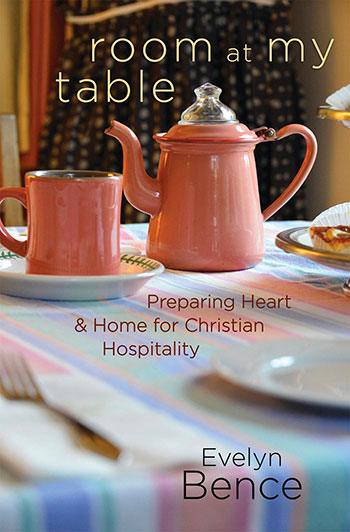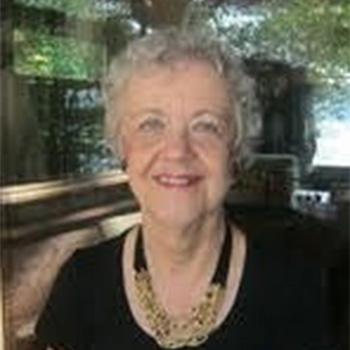Back to series

An Invitational Challenge
Click here to open a Print - Friendly PDF
Hospitality. Though the word’s cordial welcome encompasses more than culinary service, my book focuses on the host’s role of feeding people, particularly those outside the immediate family circle with its attendant obligations.
Hospitality has been characterized as a gift, even a spiritual gift, though it is not listed as such in the New Testament. There’s no mistaking that some people have natural abilities in the kitchen, in the organizational sphere, in the conversational corner. That’s why it’s so tempting to avoid responsibility: hospitality, it’s not my gift.
But the Bible calls for everyone to give it a try: “Contribute to the needs of the saints and seek to show hospitality,” writes Paul (Rom. 12:13).1 Other Epistle writers add qualifying phrases: “Show hospitality to one another without grumbling” (1 Pet. 4:9). And “Do not neglect to show hospitality to strangers” (Heb. 13:2).
You may be a high-profile hostess with a sixty-inch range. I’m not, never have been. I have a bare-bones galley kitchen, not even a dishwasher. I have people over. I make it work.
Maybe your kitchen isn’t your handicap, but it’s easy for you to name another: your spouse or children, your workload; limited parking, insufficient seating. Most anyone can find a reason for not reaching out …
But these fifty-two meditations are not about should.
They don’t present a theology or scriptural study of biblical hospitality. Nor would you find them in Better Homes and Gardens. Drawing on my own experiences—the successes as well as the failures—I’ve gone for encouragement. Dip in. Here’s what I hope you’ll find:
For hosts known for their hospitable grace and discerning culinary taste, if not skill—encouragement, camaraderie, invigoration.
For fledglings curious or envious of others who exhibit hospitable grace and culinary skill—in story form, an inspirational primer for taking a first step toward a personal success.
For guests anticipating or grateful for hospitable grace and culinary taste and sneaking a preview—an appropriate, nicely packaged gift.
For nostalgics pining for the good old days when people knew something about hospitality and grace—a smidge of humor and a handful of hope that the art of hospitality hasn’t been lost, as some claim.
For people hungry for relationships grounded in real time—an invitation to reach out and enjoy face-to-face connections: table talk.
If you read these pieces straight through, you might think that I welcome guests every weekend, which is hardly the case. This material is a condensation of decades’ worth of hospitable culinary opportunities, presented with some names changed and a few details disguised.
“Come and eat. Here, drink something.” The universal invitation never loses its potential. A parent speaking to a toddler. A friend suggesting lunch. A neighbor coaxing a grieving widow. A colleague hosting a barbeque or buffet. The invitation’s appeal is rooted deep in our humanity; we are, after all, newly needy—hungry and thirsty—every day.
And in our tradition: King David welcoming Saul’s grandson to his table like one of his own; Jesus cooking breakfast for His disciples; and the writer of the last biblical chapter beckoning the thirsty to come to the water of life.
Some contemporary invitations are vicarious and virtual, broadcast by smiling chefs talking to cameras in studios. But the best invitations are real and sincere: I’d be honored for you to sit at my table.
Risk Analysis
Cast your bread upon the waters, for you will find it after many days. (Ecclesiastes 11:1)
Accommodating my dad in his pastoral role, my mom was an inveterate hostess, logging, for tax purposes, up to six hundred servings a year. Down-home cooking, rarely more venturesome than mustard and Worcestershire. But guests appreciated her efforts—mostly.
One weekend, hosting strangers interviewing for a church job, she laid out a roast turkey dinner with mashed potatoes, bread stuffing, and gravy. Standard company fare. Right fine in my view, a high school senior. But as Mom washed the dishes, she succinctly summarized the dinner. “That didn’t work.”
“What do you mean?”
“They didn’t like it. They didn’t appreciate it. It was a flop.”
My affirmations didn’t penetrate her negative assessment.
Several years later she again felt disrespected, when only one couple came to a New Year’s open house—an afternoon buffet set out for fifty.
It’s easier to write about my  mother’s failures than my own. The New Year’s Eve party for twenty-something peers who claimed they didn’t like parties. (Did I fall asleep watching TV at my own do?) The invitations refused, some by way of Miss Manners’s practiced approach, “You are so kind, but…” and some less adroitly. The no-shows or apologies that someone forgot. The meals or desserts that I’ve chosen to forget or rosily gloss over.
mother’s failures than my own. The New Year’s Eve party for twenty-something peers who claimed they didn’t like parties. (Did I fall asleep watching TV at my own do?) The invitations refused, some by way of Miss Manners’s practiced approach, “You are so kind, but…” and some less adroitly. The no-shows or apologies that someone forgot. The meals or desserts that I’ve chosen to forget or rosily gloss over.
Entertaining—extending an invitation, say nothing of opening the door to an unbidden neighbor—is a risk. Every time. Even if hospitality is perceived to be one’s spiritual gift.
An unexpended biblical find—buried under the cast-your-bread-upon-the-waters topic sentence of Ecclesiastes 11—helps to refocus my vision. “In the morning sow your seed, and at evening withhold not your hand, for you do not know which will prosper, this or that, or whether both alike will be good” (v. 6). Be generous, the wisdom writer says, but understand the realities: some efforts “prosper” and some don’t.
Sometimes the food and the conversation “work,” sometimes neither. Sometimes we feel affirmed; sometimes we don’t. Sometimes the bread cast upon the water becomes a free-floating memory for God to redeem further down the river of time.
God, give us courage braced with wisdom as we reach out beyond ourselves and offer sustenance for table guests.
Reprinted from Room at My Table: Preparing Heart and Home for Christian Hospitality by Evelyn Bence. Copyright © 2014. Used by permission of Upper Room Books. For more information, visit bookstore.upperroom.org.
Note: 1. All Scripture quotations are from the English Standard Version.
 COPYRIGHT: This publication is published by C.S. Lewis Institute; 8001 Braddock Road, Suite 301; Springfield, VA 22151. Portions of the publication may be reproduced for noncommercial, local church or ministry use without prior permission. Electronic copies of the PDF files may be duplicated and transmitted via e-mail for personal and church use. Articles may not be modified without prior written permission of the Institute. For questions, contact the Institute: 703.914.5602 or email us.
COPYRIGHT: This publication is published by C.S. Lewis Institute; 8001 Braddock Road, Suite 301; Springfield, VA 22151. Portions of the publication may be reproduced for noncommercial, local church or ministry use without prior permission. Electronic copies of the PDF files may be duplicated and transmitted via e-mail for personal and church use. Articles may not be modified without prior written permission of the Institute. For questions, contact the Institute: 703.914.5602 or email us.
-
Recent Podcasts
The Side B Stories – Dr. James Tour’s story
by Jana Harmon, James Tour on April 12, 2024From a secular Jewish home, scientific scholar and...Read More
-
Why are Christians so Bad?
by Paul Joen on April 5, 2024
-
Questions That Matter Podcast – Dai Hankey and Gospel Hope for Weary Souls
by Randy Newman, Dai Hankey on April 5, 2024
-
Recent Publications
Isn’t Morality Relative?
by Christopher L. Reese on April 1, 2024It is widely accepted in the Western world...Read More
-
Do Muslims and Christians Worship the Same God?
by Andy Bannister on March 1, 2024
-
Artificial Intelligence and Its Impacts on Humanity
by John Lennox on February 13, 2024
0
All Booked
0.00
All Booked
0.00
All Booked
21934
GLOBAL EVENT: The Adventures of Eustace Clarence Scrubb (CSLI-Atlanta & CSLI-Chicago) 7:30PM ET/ 6:30PM CT
https://www.cslewisinstitute.org/?event=global-event-the-adventures-of-eustace-clarence-scrubb-csli-atlanta-csli-chicago-730pm-et-630pm-ct&event_date=2024-04-18®=1
https://www.paypal.com/cgi-bin/webscr
2024-04-18

Next coming event
Days
Hours
Minutes
Seconds
GLOBAL EVENT: The Adventures of Eustace Clarence Scrubb (CSLI-Atlanta & CSLI-Chicago) 7:30PM ET/ 6:30PM CT
On April 18, 2024 at 7:30 pm Virtual Online EventSpeakers

Evelyn Bence
Author





